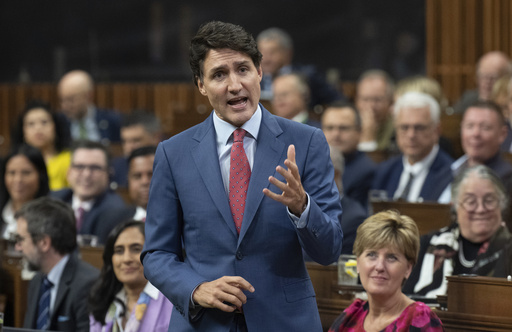
TORONTO — On Thursday, Prime Minister Justin Trudeau announced a significant decrease in the number of new immigrants allowed into Canada in the coming years, recognizing that his government had not effectively balanced immigration needs as the nation emerged from the pandemic.
Trudeau’s Liberal administration faced backlash for its ambitious plan to introduce 500,000 new permanent residents annually over the next two years. However, he revealed that the target for next year will be reduced to 395,000, followed by a decrease to 380,000 in 2026, and further to 365,000 by 2027.
During his address, Trudeau acknowledged, “As we navigated the tumultuous times following the pandemic, we failed to strike the right balance between addressing labor shortages and sustaining population growth.”
He emphasized the importance of immigration for Canada’s future but insisted it needs to be managed responsibly and sustainably.
Facing increasing calls from within his party to step aside and not pursue a fourth term, Trudeau confronts criticism over his immigration strategies and their contribution to rising housing costs.
He explained that the government’s approach will limit immigration levels over the next three years, effectively freezing population growth for the next two years. The national population increased to 41 million in April, rising from 37.5 million in 2019.
Trudeau noted the necessity to stabilize population growth to enable governments to enhance health care, housing, and social services, facilitating a better ability to support a larger population in the future.
Immigration Minister Marc Miller supported the shift towards lower immigration numbers, asserting it would address the country’s housing deficit. He also recognized the changing sentiments among the public regarding immigration.
“The volume we’ve previously proposed is concerning,” Miller noted, indicating the government is aware of the stressors citizens are facing. “We must adjust our policies to ensure the integrity of the immigration system. We strive to grow Canada’s population responsibly.”
Miller reiterated that while Canada remains an open country, it cannot accommodate everyone, confirming that the government’s immigration targets will still retain their ambitious nature.
Trudeau’s administration has often highlighted Canada’s immigration policy as superior to that of other countries due to its efficacy in welcoming newcomers and integrating them economically.
In stark contrast, Pierre Poilievre, the opposition Conservative Party leader, accused Trudeau of undermining the national agreement on immigration.
“He has ruined our immigration system through his own failings, demolishing over a century of shared understanding between Liberals and Conservatives on the issue,” Poilievre complained.
He added that Trudeau’s inability to amend the situation surrounding immigration and housing stems from his preoccupation with internal party conflicts.
In response to mounting pressures from fellow party members urging him not to seek reelection, Trudeau reaffirmed his commitment to remain active in the lead-up to the next election.
Nelson Wiseman, professor emeritus of political science at the University of Toronto, criticized the government for failing to manage immigration effectively.
“The intention to bolster the economy and address the challenges of an aging population through increased immigration was sound, but Ottawa lacks direct control over fulfilling the housing, health, education, and welfare demands of residents, be they citizens or immigrants,” Wiseman stated.
He pointed out that these responsibilities largely fall within provincial jurisdiction and often suffer from a lack of coordination with federal efforts.
While acknowledging that some Canadians have always held xenophobic views, Wiseman suggested that these sentiments have recently intensified due to frustrations over increasing challenges related to housing, health care, and education related to the influx of immigrants and temporary workers or students.
“Ottawa has been attuned to public opinion and is responding accordingly,” he concluded.
